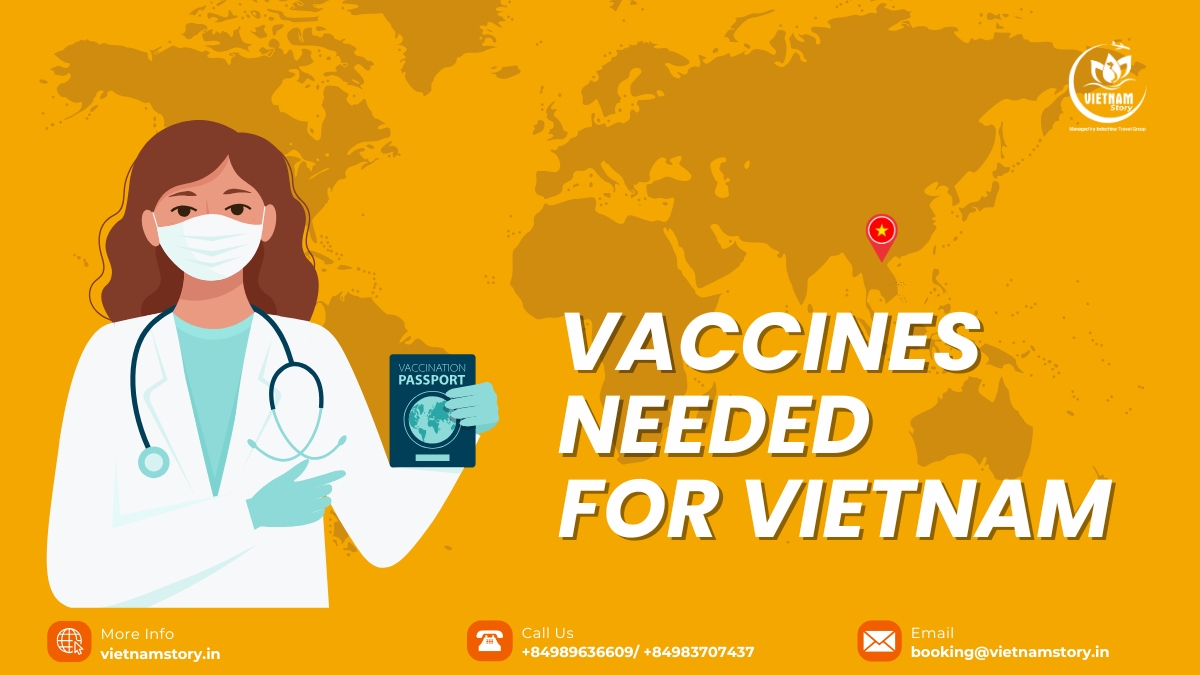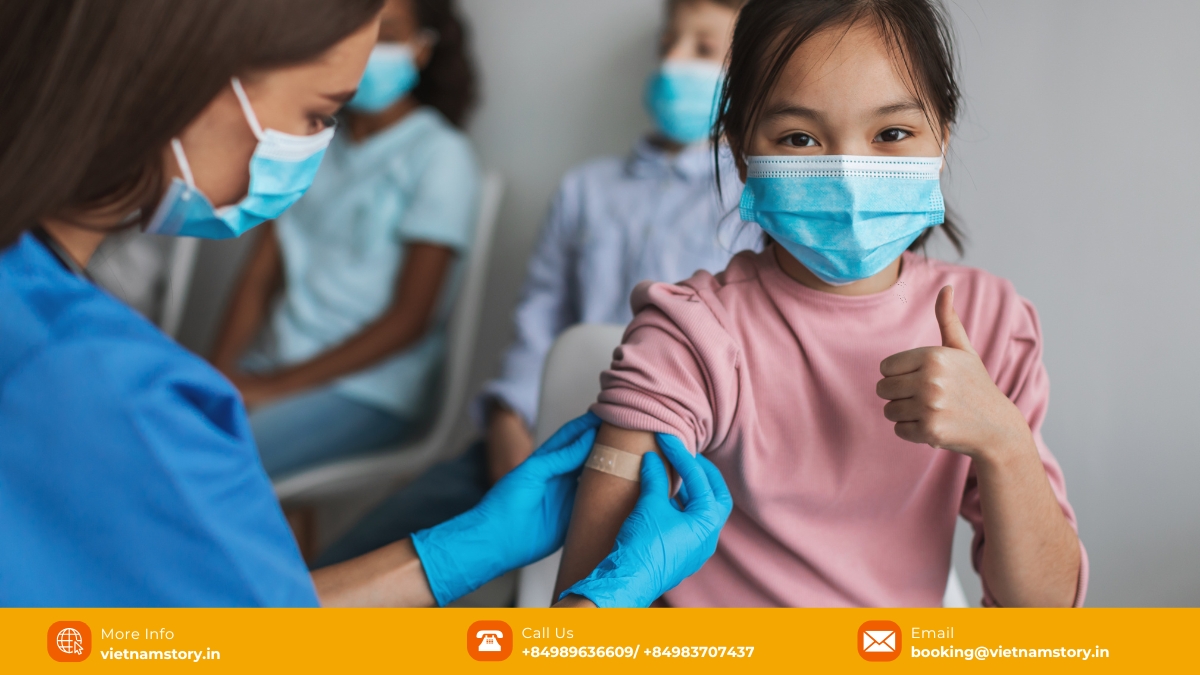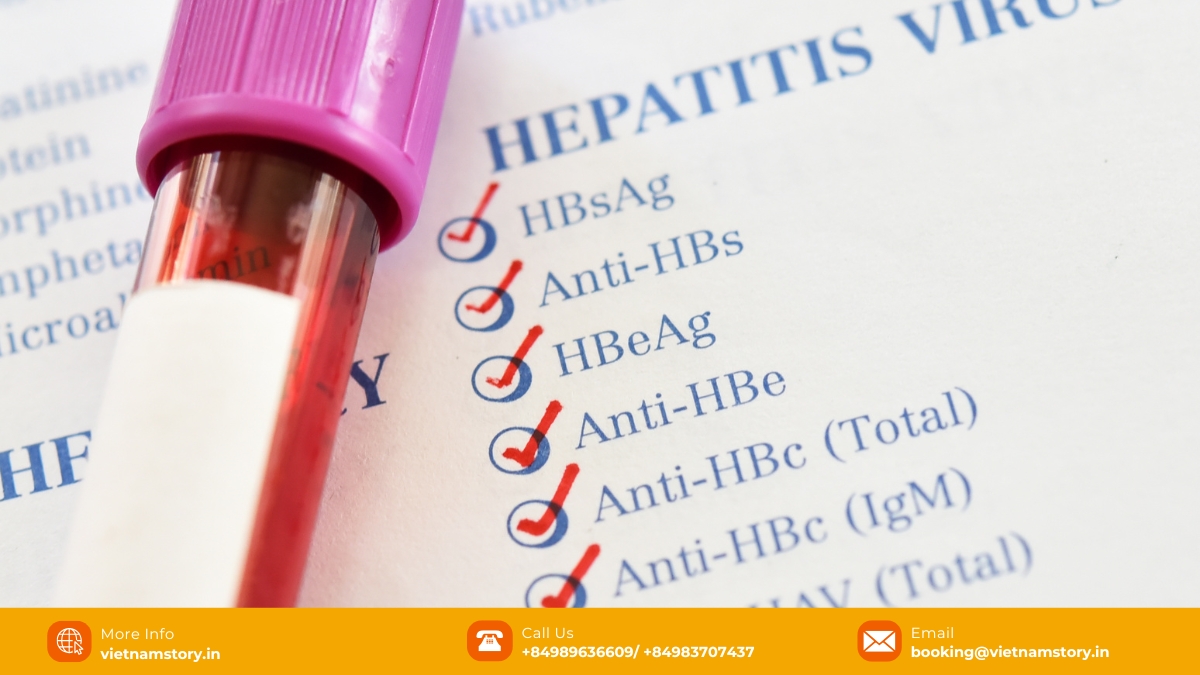Planning your incredible adventure from India to Vietnam? Fantastic choice! To ensure your journey is as safe and healthy as it is memorable, understanding the necessary travel vaccines needed for Vietnam is a crucial first step. This comprehensive guide outlines the essential immunizations required to protect you against potential health risks prevalent in Vietnam and Southeast Asia.
We cover everything from vital routine boosters like MMR and Tdap to specific travel vaccines needed for Vietnam such as Hepatitis A, Typhoid, Japanese Encephalitis, and Rabies considerations. We’ll detail official recommendations, optimal timing for vaccinations, and other critical health precautions to help Indian visitors prepare thoroughly for an unforgettable trip.

Safeguarding your journey: A comprehensive guide to vaccines needed for Vietnam
Understanding the Need for Vaccination: Your First Line of Defense
Vaccinations are a cornerstone of preventative healthcare, acting as a shield against infectious diseases. When travelling internationally, particularly from India to Vietnam, you face potential risk exposure to illnesses not commonly found back home, or for which your immunity might have decreased over time. Vaccines work by preparing your immune system to recognize and fight specific viruses or bacteria, significantly reducing your chance of getting sick or lessening the severity if you do.
Securing the necessary vaccinations needed for Vietnam before you travel is a proactive investment in your health, allowing you to explore Vietnam’s vibrant culture, stunning landscapes, and delicious cuisine with greater peace of mind. It’s the foundation of disease prevention for travelers.
READ MORE: Navigating Vietnam: A Guide to Visas for Indian Tourists
Essential Routine Vaccinations: Updating Your Foundational Protection
Before considering travel-specific shots, ensuring your routine immunizations are current is paramount. These are the standard vaccines recommended globally and in India, offering baseline protection. Remember, immunity can fade, and booster shots are often required. Consult your doctor or check your vaccination records.
- Measles, Mumps, Rubella (MMR): Protects against highly contagious viruses. Global measles cases are rising, and significant measles outbreaks have occurred in Vietnam. Ensure you’ve received the recommended two doses in your lifetime.
- Diphtheria, Tetanus, Pertussis (Tdap or DPT): Protects against serious bacterial infections. Tetanus causes muscle spasms, Diphtheria affects breathing, and Pertussis causes severe ‘whooping cough’. Due to recent diphtheria outbreaks in Vietnam, possibly linked to lower vaccination coverage post-pandemic, ensuring you’re up-to-date is vital. A booster is generally needed every 10 years.
- Polio: While rare, the risk persists globally. Due to an increase in cases, health authorities like the CDC and WHO now recommend an additional adult booster dose for most international travelers heading to any destination, including Vietnam, irrespective of past vaccination history.
- Varicella (Chickenpox): Recommended if you haven’t had the disease or vaccine, as it can be more severe in adults.
- Influenza (Flu): An annual shot is recommended, especially useful during travel due to close proximity to others. Vaccine components change yearly based on circulating strains.
- COVID-19: Ensure you are up-to-date with the latest recommended COVID-19 vaccines and boosters according to current public health guidelines.
- Shingles & Pneumonia: While not strictly routine for all, these are often recommended for older travelers (e.g., 65+) or those with certain underlying health conditions. Discuss with your doctor if applicable.
Recommended Travel Vaccines Needed for Vietnam: Targeted Protection
Beyond routine shots, specific travel vaccines needed for Vietnam target diseases prevalent in the region or spread via particular routes, like contaminated food/water or insect bites. Which ones you need depend on factors like your precise itinerary (cities vs. rural areas), trip duration, planned activities (trekking, volunteering), and personal health. A consultation with a travel health specialist provides personalized official recommendations based on geographic endemicity and your individual traveler susceptibility.

Hepatitis A Vaccine Needed for Vietnam
Hepatitis A is a viral liver infection easily spread through the fecal-oral route via contaminated food or water. This risk exists even in cities and tourist areas. The Hepatitis A vaccine (usually a two-dose series given 6 months apart) is highly recommended for nearly all unvaccinated travelers heading to Vietnam. It offers excellent, long-lasting (likely lifelong) protection.
Typhoid Vaccine Needed for Vietnam
Typhoid fever, caused by the bacterium Salmonella Typhi, is another illness spread through contaminated food and water, particularly where sanitation is less developed. Vaccination is strongly advised, especially if you’ll be visiting smaller cities, rural areas, staying with locals, or being adventurous with food choices (like street food). Options include:
- An injectable vaccine (shot) providing protection for approximately 2 years.
- An oral vaccine (pills) providing protection for about 5 years (requires swallowing pills; capsules must be kept refrigerated).
Discuss the best choice with your doctor. Importantly, vaccination reduces risk but doesn’t eliminate it; practicing safe eating and drinking remains crucial.
Hepatitis B Vaccine Considerations
Hepatitis B affects the liver and spreads through infected blood, semen, or other body fluids (e.g., contaminated needles, unprotected sex). It can lead to chronic liver disease. The multi-dose vaccine provides lifelong protection and is recommended for all unvaccinated travelers to Vietnam, especially given the high prevalence of chronic Hepatitis B in the local population. Consider it strongly if you might:
- Get tattoos, piercings, or acupuncture.
- Have medical or dental procedures.
- Engage in sexual contact with new partners.
- Be staying for a long duration (long-term traveler), traveling frequently, or visiting remote areas.
- Potentially need medical care locally.

Japanese Encephalitis (JE) Vaccine Needed for Vietnam
Japanese Encephalitis is a serious viral disease causing brain inflammation (encephalitis), transmitted through the bite of an infected mosquito. It can be fatal or cause long-term neurological problems. The JE virus is endemic throughout Vietnam, meaning it’s consistently present. Risk is higher in rural and agricultural areas (especially near rice paddies and pig farms).
Transmission usually peaks during the rainy season (May to October), with the highest rates often reported in the northern provinces around Hanoi and bordering China. Understanding Vietnam’s weather patterns can help you prepare for seasonal risks like increased mosquito activity during these wetter months.
The CDC recommends JE vaccination for travelers who:
- Plan to spend one month or more in endemic areas.
Vaccination should also be considered for short-term travelers (<1 month) if they:
- Will spend substantial time outdoors in rural or agricultural areas, especially during peak season (e.g., extensive hiking, camping, biking, fieldwork).
- Will stay in places without air conditioning, screens, or bed nets.
- Are uncertain about their specific activities or itinerary length in risk areas.
- Are frequent travelers to JE-endemic regions.
A personalized risk assessment with a travel doctor is key to decide if the JE vaccine is appropriate for your trip.
Rabies Vaccination Considerations
Rabies is a viral disease, almost always fatal once symptoms appear, transmitted via the saliva of infected animals – usually through bites, but also scratches or licks on broken skin or mucous membranes (eyes, mouth). Vietnam is considered a high-risk country for rabies, with dogs being the main source of human infections. Be cautious around stray animals, including monkeys.
Pre-exposure prophylaxis (PrEP) vaccination (usually 2-3 doses before travel) doesn’t eliminate the need for treatment after exposure but simplifies it significantly. PrEP is recommended for:
- Long-term travelers or expatriates.
- Travelers engaging in activities with higher risk of animal contact (e.g., veterinarians, animal researchers, adventure travelers, spelunkers/cavers).
- Children, who may be more likely to play with animals and less likely to report bites/scratches.
- Travelers visiting remote areas where prompt access to reliable Post-Exposure Prophylaxis (PEP), especially Rabies Immune Globulin (RIG), might be limited or unavailable.
Crucially, IF BITTEN OR SCRATCHED by any animal in Vietnam (dog, cat, monkey, bat, etc.):
- Immediately wash the wound thoroughly with soap and running water for at least 15 minutes.
- Apply an antiseptic (like iodine or alcohol).
- Seek urgent medical attention IMMEDIATELY to assess the need for PEP. This typically involves further vaccine doses and possibly RIG, even if you received pre-exposure vaccination. While rabies vaccines (PEP) are generally available in district/provincial health centers in Vietnam, RIG might only be found in larger centers/institutes. Knowing where to find reliable care is crucial; you can learn more about international hospitals in Vietnam here, which often cater to foreigners and may have easier access to necessary treatments like RIG.
Important Note on Yellow Fever Entry Requirements
To be clear: Yellow Fever disease is NOT present in Vietnam. There is no risk of contracting it there. However, Vietnam (like many countries) enforces World Health Organization (WHO) International Health Regulations to prevent the importation of the virus.
Therefore, proof of Yellow Fever vaccination (the International Certificate of Vaccination or Prophylaxis, often called the “Yellow Card”) IS REQUIRED for entry for all travelers aged 1 year or older who are arriving from a country with risk of Yellow Fever transmission. This rule also applies if you have merely transited for more than 12 hours through an airport in a Yellow Fever risk country.
Since many flights from India might transit through Africa or South America, check your full flight itinerary carefully against the current WHO list of risk countries. This is a strict immigration requirement and you could be denied entry or quarantined if you need the certificate and don’t have it.
Other Potential Vaccines to Discuss
- Chikungunya: Another virus spread by mosquitoes, causing fever and severe joint pain. While present in the region, widespread outbreaks impacting tourists are less common than Dengue. A vaccine exists but is typically considered mainly for specific travelers based on CDC criteria: those aged 65+ spending ≥2 weeks cumulative time outdoors OR anyone planning a cumulative stay of ≥6 months. For most tourists, diligent mosquito bite prevention is the primary strategy.
- Cholera: A bacterial disease causing severe diarrhea, spread through heavily contaminated water or food. The risk for typical tourists following safe food/water practices is generally considered low in Vietnam. Vaccination is not routinely recommended but might be discussed for aid workers or those in outbreak situations.
- Meningitis (Meningococcal): Protects against bacterial meningitis. Not routinely recommended for standard tourists to Vietnam but might be considered for specific groups like students on exchange or long-term humanitarian workers in close community settings.
Malaria and Other Insect-Borne Diseases: The Mosquito Menace
Beyond JE and Chikungunya, mosquitoes in Vietnam are vectors for other significant diseases:
- Malaria: Caused by Plasmodium parasites transmitted by infected Anopheles mosquitoes (primarily dusk/dawn biters). Malaria risk in Vietnam is geographically specific. It’s mainly a concern in certain rural, forested, or mountainous areas, particularly the Central Highlands (Tay Nguyen region) and provinces bordering Laos and Cambodia. Major cities (Hanoi, Ho Chi Minh City, Da Nang) and popular coastal destinations (Nha Trang, Hoi An, Mui Ne, Ha Long Bay, Phu Quoc) are generally considered very low or no risk areas where preventative medication is not typically recommended. However, if your itinerary includes travel to known risk areas, taking prescription antimalarial medication (chemoprophylaxis) is advised. Options include Atovaquone-proguanil, Doxycycline, or Tafenoquine. Note: Due to resistance, Mefloquine should be avoided if traveling to the specific rural areas of Binh Duong, Binh Phuoc, Dak Lak, Dak Nong, Gia Lai, Khanh Hoa, Kon Tum, Lam Dong, Ninh Thuan, and Tay Ninh provinces. Mosquito bite prevention is crucial in all areas, regardless of medication use.
- Dengue Fever: A major health concern throughout Vietnam, transmitted by Aedes mosquitoes which bite primarily during the daytime. Dengue is prevalent in both urban and rural areas. Symptoms range from mild fever to severe, life-threatening hemorrhagic fever. There is no widely available vaccine for travelers. Prevention relies entirely on avoiding mosquito bites.
- Zika Virus: Also transmitted by Aedes mosquitoes. While the risk to travelers is generally considered low, Zika infection during pregnancy can cause serious birth defects (microcephaly). Pregnant women or those planning pregnancy should take extreme precautions against bites and discuss travel plans carefully with their doctor.
Effective Mosquito Bite Prevention is ESSENTIAL against JE, Malaria, Dengue, Zika, and Chikungunya:
- Apply insect repellent containing effective active ingredients like DEET (20-50%), Picaridin (20%), or Oil of Lemon Eucalyptus (OLE/PMD) rigorously to all exposed skin. Reapply according to product instructions (more often if sweating or swimming).
- Wear long-sleeved shirts, long trousers, socks, and shoes, especially during peak mosquito biting times (dusk/dawn for malaria vectors; daytime for dengue/Zika vectors, though bites can occur anytime). Choose light-colored, loose-fitting clothing.
- Sleep in rooms that are well-screened or air-conditioned. If sleeping quarters are exposed to the outdoors (especially in rural/malarial areas), use an insecticide-treated bed net (ITN).
- Consider treating outer clothing, shoes, and gear (like backpacks) with permethrin insect repellent (follow product instructions carefully; do not apply directly to skin). This provides an extra layer of protection, particularly useful for trekking or extensive outdoor time.
Tailoring Vaccination Plans: Considerations for Specific Indian Travelers
Individual vaccine needs can vary:
- Children: Indian parents must consult a pediatrician or travel clinic specializing in pediatric travel health well ahead of time. Vaccine schedules and dosages can differ for children. They also face unique risks (e.g., higher likelihood of playing with animals increasing rabies exposure risk).
- Elderly Travelers (e.g., 65+): May have age-related considerations (e.g., higher risk for severe disease, potentially weaker vaccine response). Vaccines like Pneumonia and Shingles might be strongly recommended in addition to travel vaccines. Specific criteria for the Chikungunya vaccine apply to this age group. Personalized medical advice is vital.
- Travelers with Pre-existing Conditions: Those with chronic illnesses (diabetes, heart disease, asthma, immunocompromising conditions) need careful consultation with their specialist and a travel doctor. Discuss medication management, specific precautions (e.g., air quality impact), and carry relevant medical documents.
- Pregnant Women: Require specialized pre-travel counseling from both their obstetrician and a travel health expert before planning travel. Travel to Vietnam may need careful consideration due to risks like Zika virus. Some vaccines are contraindicated during pregnancy. Travel might be advised against depending on the destination within Vietnam and stage of pregnancy.
Timing is Key: Preparing for Your Vaccination Schedule
Start the process early! Aim to consult a doctor or travel medicine clinic at least 6 to 8 weeks before your departure date from India. This lead time is necessary because:
- Some vaccines require multiple doses administered weeks or months apart (e.g., Hepatitis B, JE, Rabies PrEP).
- Your body needs time (usually a couple of weeks after the final dose) to develop full protective immunity.
- It allows time to manage any potential mild side effects.
- You’ll need time to get prescriptions filled (e.g., for antimalarials or traveler’s diarrhea kits).
Even if your trip is less than 6 weeks away, seek advice immediately. Some protection is better than none, and certain vaccines can sometimes be administered on an accelerated schedule, although the standard timing is always preferred for optimal, long-lasting immunity.
READ MORE: Travel Insurance: Your safety net for a worry-free Vietnam adventure
Seeking Professional Guidance: The Importance of Expert Advice
While this guide provides comprehensive information based on authoritative sources like the CDC and WHO, tailored for Indian travelers, it cannot replace a personalized consultation with a qualified healthcare professional or a specialized travel medicine clinic. They are essential because they will:
- Assess your individual health status, including allergies and past vaccination history.
- Evaluate your specific and detailed travel itinerary within Vietnam (which provinces, cities vs. rural, duration, planned activities, accommodation style).
- Provide customized recommendations on the precise vaccines needed for your Vietnam trip, malaria prevention strategy (if required), and other health precautions based on your personal risk profile.
- Prescribe necessary items like antimalarial drugs or medications for self-treatment of traveler’s diarrhea.
Come prepared to discuss your travel plans in detail to get the most accurate and helpful advice.
Beyond Vaccines: Additional Precautions for a Healthy Trip in Vietnam
Vaccination is a critical shield, but combining it with other preventative behaviors provides the strongest defense:
- Food and Water Safety: Absolutely crucial for preventing traveler’s diarrhea (which can affect a significant percentage, 20-50%, of visitors) and serious infections like Hepatitis A, Typhoid, and Cholera. Strictly adhere to the “Boil it, Cook it, Peel it, or Forget it” rule:
- Drink only bottled water with an intact seal, or water reliably boiled or treated (purification tablets/filters). Carbonated beverages are generally safe.
- Avoid tap water completely, including for brushing teeth or in ice cubes. Be wary of ice unless certain it’s from purified water (often cylindrical with a hole in reputable places, but still carries risk).
- Eat food that is cooked thoroughly and served steaming hot. Avoid food that has been sitting at room temperature.
- Exercise extreme caution with street food. If you indulge, choose popular stalls with high turnover and visibly clean practices, but understand the inherent risk. Avoid raw items like salads or uncooked meats/seafood from street vendors.
- Avoid raw or undercooked meat, poultry, seafood (especially shellfish), and eggs (ensure yolks are firm). Avoid traditional dishes like ‘tiet canh’ (raw blood pudding).
- Only eat fruits and vegetables you can peel yourself (e.g., bananas, mangoes, oranges) or that have been washed in safe water and thoroughly cooked. Avoid pre-cut fruit platters.
- Wash hands frequently with soap and safe water or use an alcohol-based hand sanitizer (at least 60% alcohol), especially before eating and after using the restroom.
- Discuss obtaining a prescription kit for self-treatment of moderate-to-severe traveler’s diarrhea with your doctor.
- Insect Bite Prevention: As detailed above, practice this diligently day and night using repellents, protective clothing, and bed nets where appropriate.
- Animal Avoidance: Do not approach, feed, or handle any animals, especially stray dogs and monkeys, to prevent bites/scratches and potential Rabies exposure. Supervise children closely.
- Water Exposure Risks (Freshwater): Avoid swimming, wading, or activities in freshwater bodies like lakes, rivers, ponds, or rice paddies, particularly in rural areas, due to the potential risk of Leptospirosis (bacterial infection from animal urine) and parasites like Schistosoma (though Schistosomiasis is not considered endemic in Vietnam itself, caution is wise near borders). Chlorinated hotel pools are generally safe. Saltwater swimming is also generally safe from these specific risks.
- Personal Hygiene: Simple, frequent handwashing is highly effective. Avoid touching your face (eyes, nose, mouth) with unwashed hands.
- Sun Protection: Vietnam can be hot and sunny. Use high-SPF sunscreen, wear hats/sunglasses, seek shade during peak hours, and stay hydrated with safe fluids.
- Air Quality Awareness: Be aware that major cities like Hanoi and Ho Chi Minh City can experience high levels of air pollution, particularly at certain times of the year. This can exacerbate respiratory conditions like asthma. Check air quality indexes if concerned and consider wearing a mask (e.g., N95) outdoors during periods of poor air quality if you have respiratory issues.
- Traffic Safety: Road traffic, especially involving motorbikes, can be chaotic. Be extremely cautious as a pedestrian. Look carefully in all directions before crossing (traffic may not follow expected rules), use crosswalks where available, and proceed predictably. Avoid using motorbikes unless experienced and properly licensed/insured; always wear a helmet.
Conclusion: Travel Prepared, Travel Healthy
Ensuring you receive the necessary travel vaccines needed for Vietnam and adhering to health precautions is fundamental to safeguarding your well-being on your journey from India. By proactively getting appropriate immunizations (updating routine shots and obtaining specific travel vaccines needed for Vietnam like Hepatitis A, Typhoid, and possibly JE or Rabies based on personalized advice), practicing rigorous mosquito bite prevention, maintaining strict food and water hygiene, and avoiding risky behaviors, you significantly lower your chances of health problems.
This preparation empowers you to travel with confidence, fully embracing Vietnam’s captivating beauty, rich history, and unique cultural tapestry. Remember, the combination of vaccination and consistent preventative habits offers the most robust protection against potential health threats.
Crucially, secure comprehensive travel insurance that includes coverage for medical emergencies and, importantly, medical evacuation. Given the variability in healthcare quality outside major international clinics/hospitals in Hanoi and Ho Chi Minh City, and potential language barriers, having robust evacuation coverage to a nearby country with advanced medical facilities (like Singapore or Bangkok) provides an essential safety net.
While this guide aims to be thorough, always consult with your doctor or a travel medicine specialist well before your departure. They provide the essential personalized assessment and advice tailored to your unique health profile and specific travel plans. By prioritizing your health through diligent planning and preparation, you set the stage for a safe, healthy, and truly unforgettable Vietnamese adventure!










